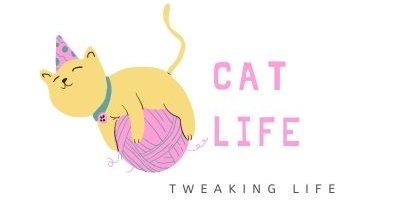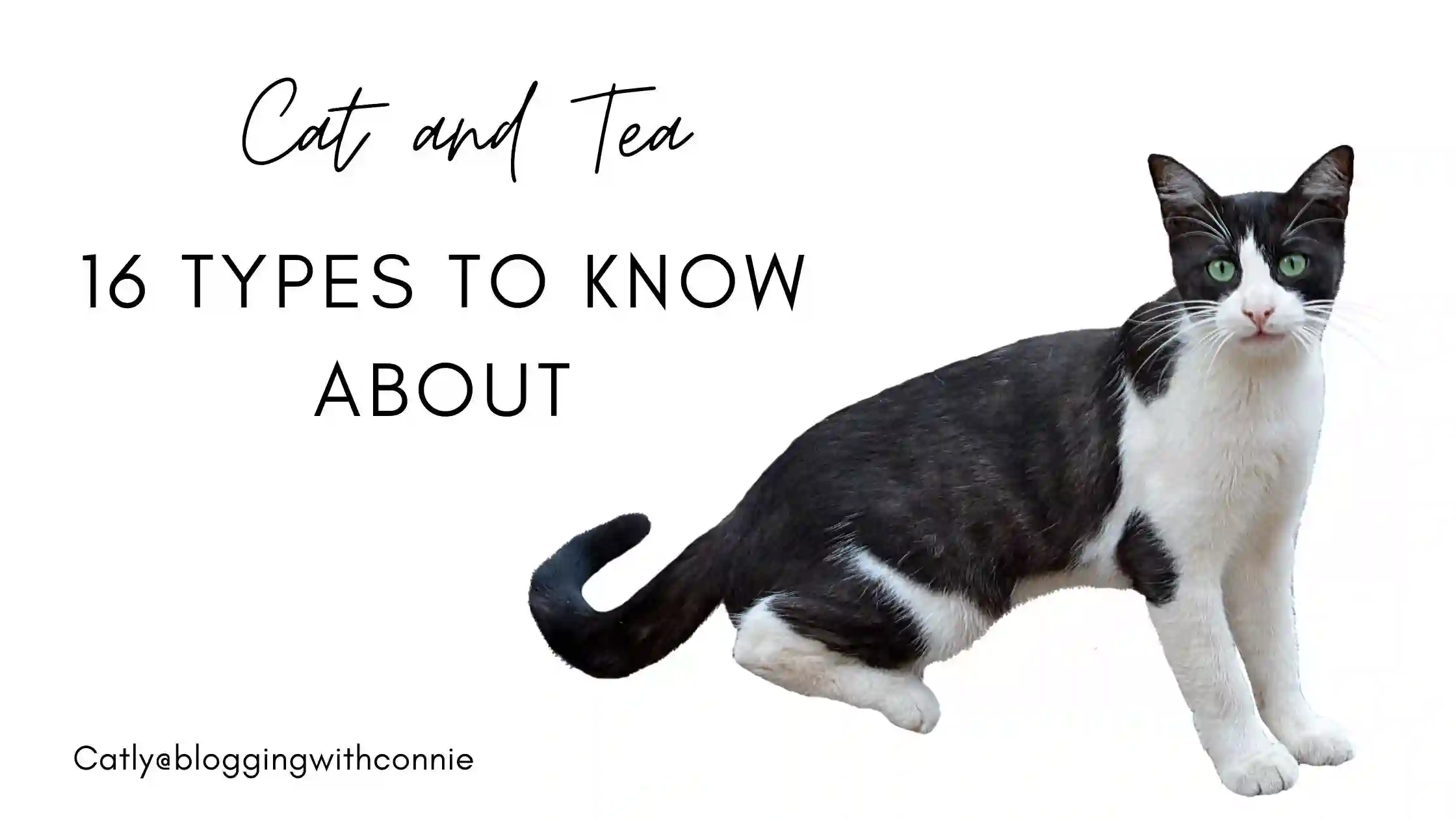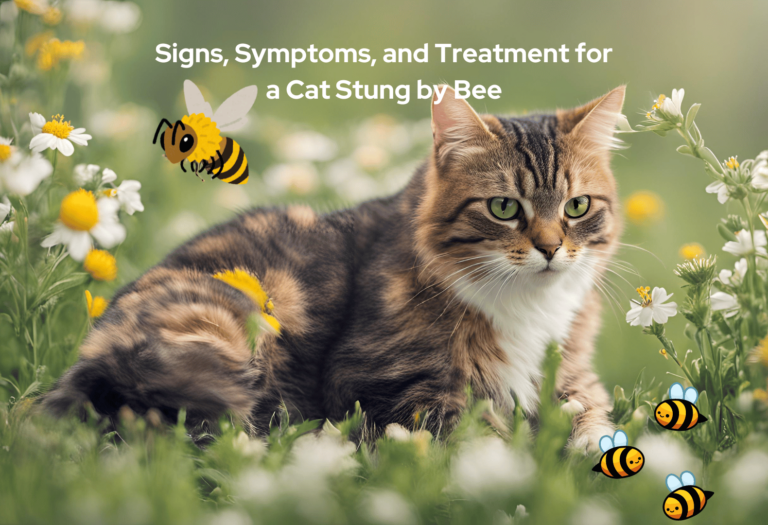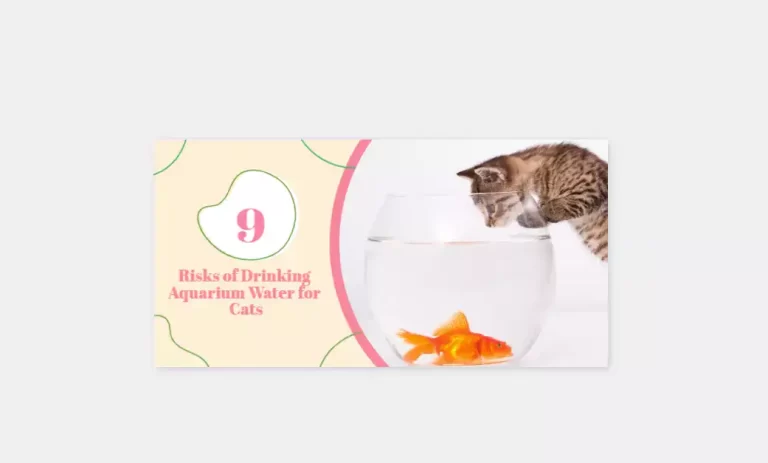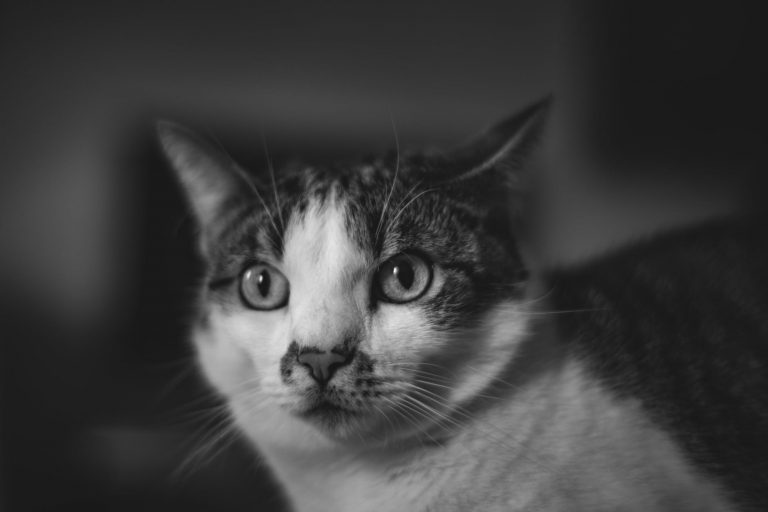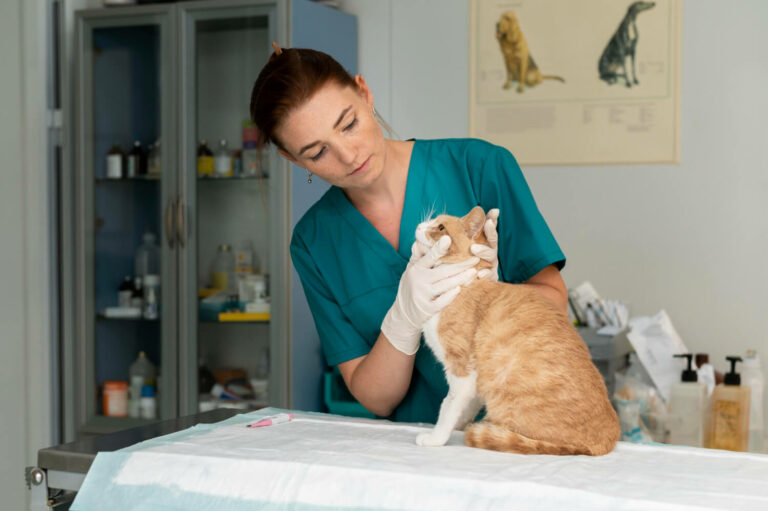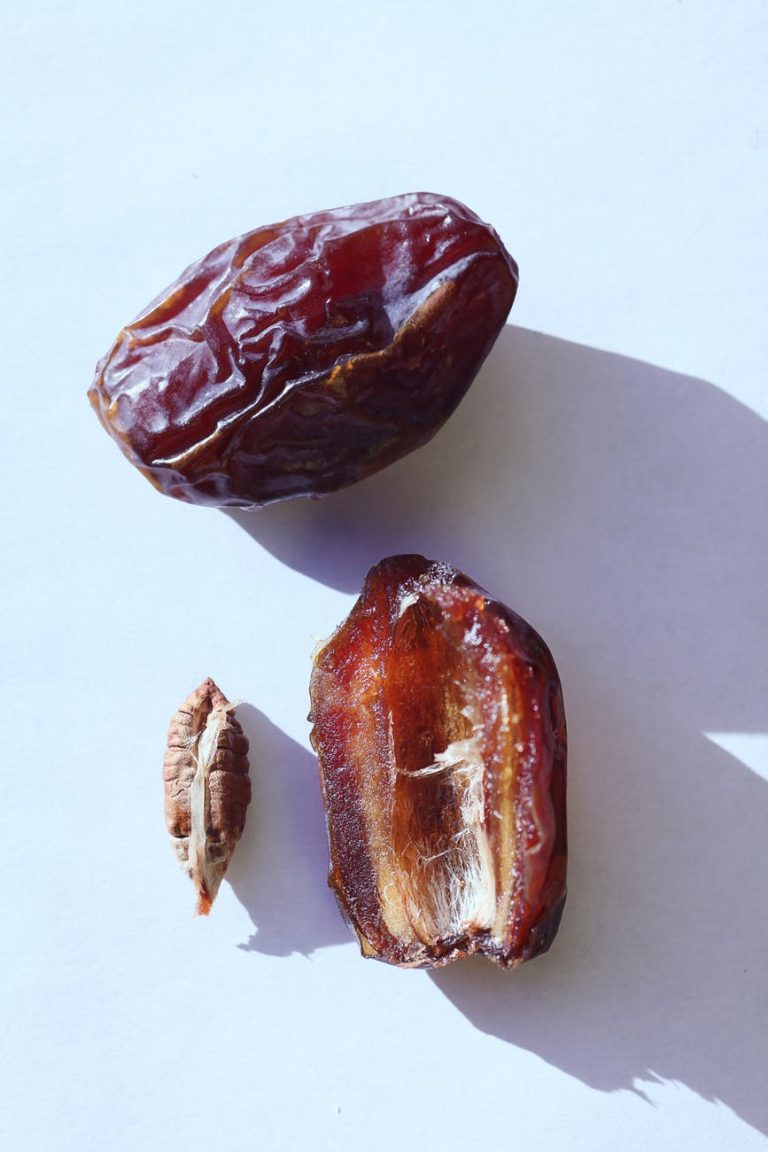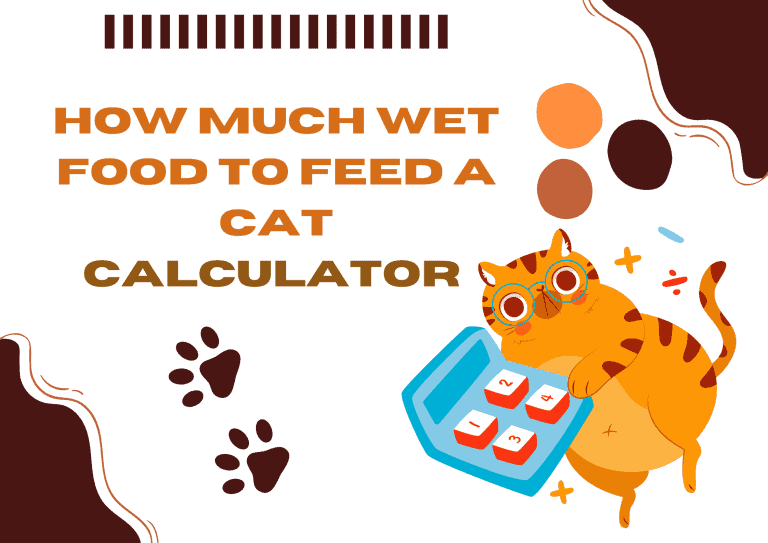Can Cats Drink Tea? Is Tea Bad for Cats? 16 Types to Know About
Tea is a favorite among many cultures and sometimes you might find your cat has taken a sip. But, can cats drink tea? Is it safe for them? This blog post will discuss the different types of tea, highlight those that are safe for your cat, and what to do in case your cat accidentally drinks your tea.
Key take aways:
- Most teas are not safe for your cat.
- Avoid giving your cat caffeinated tea.
Can Cats Drink Tea
Yes, cats can drink different types of tea in very limited amounts, or as an occasional treat. However, it is important to make sure that the tea you offer your cat is decaffeinated, unsweetened, and does not have any artificial flavors, additives or spices.
Which Teas Can Cats Drink?
1. Can Cats Drink Black Tea?

Cats should not drink black tea. Black tea contains caffeine, which cats are very sensitive to. Too much caffeine can increase their heart rate and can even be fatal. Caffeine intoxication is a dangerous medical issue, so cats should avoid it, as it could cause poisoning, vomiting, and diarrhea.
2. Can Cats Drink Catnip Tea?
Cats can safely drink catnip tea. Catnip is a popular and calming plant for cats, and making catnip tea is a great way to give them an occasional treat. However, it’s important to remember that the tea should be weak and without any other ingredients that could be toxic to them.

3. Can Cats Drink Decaf Tea?
Yes, cats can drink decaf tea, as long as it is unsweetened and free of artificial flavors. Decaffeinated tea is generally considered safe for cats, although it should be consumed in limited amounts.
4. Can Cats Drink Dandelion Tea?
Yes, cats can drink dandelion tea, as long as it is properly diluted and cooled and given in very small doses. Dandelion root tea contains powerful antioxidants and anti-anxiety compounds that can be beneficial to cats.
However, it is important to be vigilant when serving cats dandelion tea, as too much can cause an upset stomach or diarrhea.
5. Can Cats Drink Earl Grey Tea?

No, cats should not drink earl grey tea. Earl grey tea contains essential oils, which are toxic to cats as their bodies are not designed to process them. Essential oils that are commonly used to flavor teas and beverages are much more dangerous to cats than caffeine or other tea components.
6. Can Cats Drink Green Tea?
Cats can drink green tea as long as it is decaffeinated. Green tea is generally safe for cats and contains polyphenols, which have antioxidant, anti-inflammatory, and anti-carcinogenic effects. It should be consumed in moderate amounts.
7. Can Cats Drink Hot Chocolate?
Cats cannot drink hot chocolate. While it is safe for humans, it can be dangerous for cats as it contains theobromine, an ingredient that is toxic to cats and can cause fatal toxicity in some cases. Hot chocolate can also contain ingredients like sugar and fat which cats should not eat in excess.

Additionally, the caffeine content of hot chocolate can be dangerous for cats, even in small amounts, as it can cause life-threatening caffeine overdose in cattos.
8. Can Cats Drink Barley Tea?
Cats can safely drink barley tea. It is loaded with melatonin, amino acids, and tryptophan which help cats relax. Barley is also good for digestion, aids bowel movements, improves blood circulation, and reduces inflammation.
9. Can Cats Drink Iced Tea?
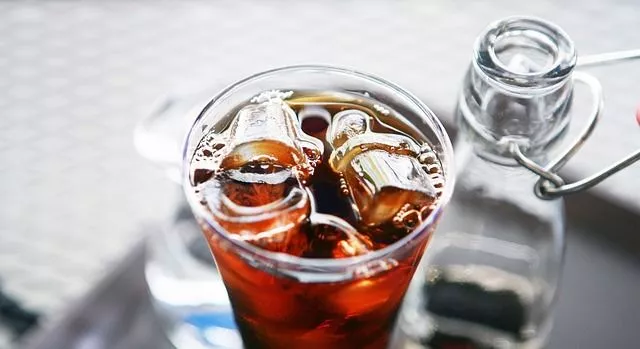
Cats should not drink iced tea. Iced tea contains caffeine, which is toxic to cats, as well as ice cubes, which can be hazardous.
Additionally, ice cubes can cause brain freeze, which can be damaging to a cat’s blood vessels and nerves.
Also read: Why cats prefer warm water over cold water?
Furthermore, milk tea can cause cats to experience digestive problems, such as diarrhea, vomiting, and loose stool.
Lastly, cold tea can also cause throat infections in cats, especially if they are still kittens.
10. Can Cats Drink Jasmine Tea?
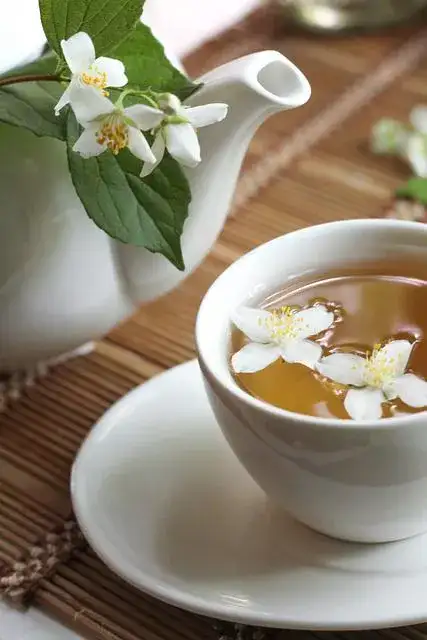
Cats can drink jasmine tea. It’s loaded with antioxidants that protect your cat’s body from free radical cell damage. The tea also helps with calming the nerves and the body, reducing irritability, restlessness, and insomnia.
It’s one of the few essential oils that the ASPCA lists as non-toxic to cats.
11. Can Cats Drink Lavender Tea?
Yes, cats can safely drink lavender tea, as long as it is diluted and cooled. Lavender is an essential oil, which can be toxic to cats if consumed in too large of a quantity.
It’s important to ensure that the tea is properly diluted and cooled before giving it to your cat.
12. Can Cats Drink Nettle Tea?
Nettle tea is safe for cats to drink. The herb is a natural diuretic that helps cats easily pass extra fluids and salt in their bodies.
Nettles are also packed with magnesium, iron, calcium, and vitamins, all of which help boost your cat’s immune system.
13. Can Cats Drink Peppermint Tea?
Cats should not drink peppermint tea. Peppermint essential oil is toxic to cats and should be avoided at all costs. On the other hand, peppermint-flavored tea bags are not lethal to cats. However, they can still upset your cat’s digestive system.
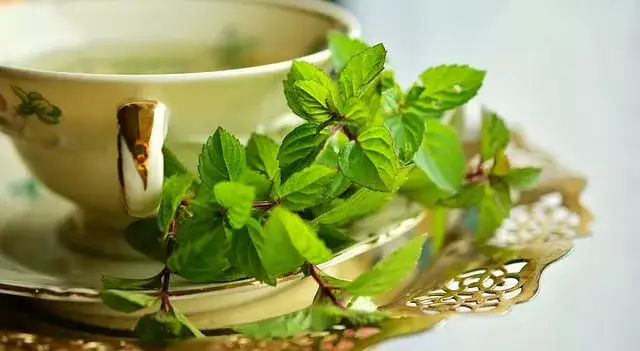
14. Can Cats Drink Raspberry Leaf Tea?
Cats can drink raspberry leaf tea. The herbal tea is a safe and natural remedy for cats with digestive issues, such as nausea and vomiting. It is also a great source of vitamin C, which can help boost the immune system.
15. Can Cats Drink Rooibos Tea?

Cats can drink rooibos tea. This is a caffeine-free, herbal tea that is safe for cats. It contains no essential oils, so it poses no risk of toxicity. Furthermore, rooibos has many health benefits, including antioxidant and anti-inflammatory properties, which can be beneficial for cats.
16. Can Cats Drink Valerian Tea?
Cats can drink valerian tea as long as it is diluted and in very small doses. Valerian root is a mild stimulant and can boost a cat’s energy levels, making it a great option for cats with anxiety or insomnia. However, too much valerian tea can cause an upset stomach or diarrhea in cats.
Some cats may respond negatively to valerian tea and become overly active, so it is important to be aware of how your cat responds to the tea.
Are There Any Herbal Teas Cats Can Safely Drink?
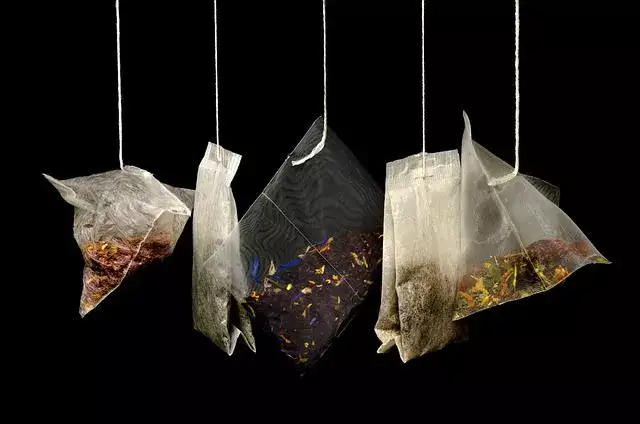
Absolutely! Diluted and cooled herbal teas, such as those made with chamomile, echinacea, calendula, valerian, licorice root, dandelion root, and catnip are all safe for cats. Chamomile, valerian, and catnip are all known for their calming effects on cats.
It’s important to steep the herbs for only half the time that is required for humans when preparing for cats and serve the tea at room temperature.
| Type of tea | Health benefits |
| Green tea | Contains antioxidants that protect against cellular damage, anti-inflammatory and anti-carcinogenic effects |
| Catnip tea | Contains melatonin, amino acids, and tryptophan that helps with relaxation, aids bowel movements, improves blood circulation, and reduces inflammation |
| Dandelion tea | Contains powerful antioxidants and anti-anxiety compounds, aids digestion |
| Barley tea | Contains antioxidants that protect against cellular damage, helps with calming nerves and the body, reduce irritability, restlessness, and insomnia |
| Jasmine tea | Contains antioxidants that protect against cellular damage, help with calming nerves and the body, reduce irritability, restlessness, and insomnia |
| Raspberry leaf tea | A natural remedy for digestive issues such as nausea and vomiting and is a good source of vitamins |
What Are the Risks of Cats Drinking Tea?
1. Tea Contains Caffeine, Which Can Be Toxic to Cats
Caffeine is a natural stimulant found in many foods and drinks such as tea, coffee, and energy drinks. It is a central nervous system stimulant that works by blocking adenosine receptors in the brain, which in turn increases alertness and energy levels.
Unfortunately, caffeine can be very dangerous for cats, even in small doses.
2. Some Teas, Such As Herbal Teas, May Contain Ingredients That Are Toxic to Cats
When it comes to types of teas that are likely to contain ingredients that are toxic to cats, one should avoid any citrus teas, chai teas, and any other teas containing other harmful ingredients such as essential oils, grapes, citrus, or mint.
Earl Grey tea, English breakfast tea, and any teas that contain coffee beans should also be avoided.
Finally, mint teas should be avoided, except catmint tea, which is a variety specifically formulated for cats.
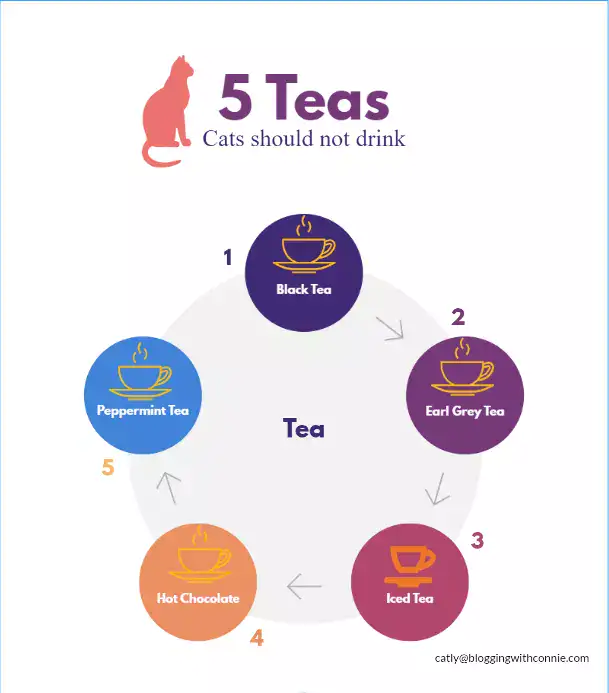
3. Tea Can Cause Gastrointestinal Problems in Cats
Gastrointestinal problems that can occur from cats drinking tea include :
- Diarrhea
- Vomiting
- Increased saliva
- Lethargy
- Tremors, and collapse
- Fever
- High blood pressure
- Increased urination
- Cardiac arrhythmias
- Coma or death.
5. Tea Can Cause Weight Gain in Cats
Tea, in addition to containing caffeine, which can be toxic to cats, can also cause weight gain in cats and lead to health problems.
The sugar that is often added to tea can be harmful to cats, as they cannot taste sweets and lack the enzymes to properly digest sugar. This can result in a higher blood sugar level, which can lead to obesity and diabetes.
6. Tea Can Cause Hyperactivity and Restlessness in Cats
The effects of tea on cats’ behavior and energy levels can be quite severe. Caffeine, which is often found in many types of tea, is a stimulant and can cause an increased heart rate, hyperactivity, restlessness, and excessive vocalization.
What Are the Symptoms of Caffeine Poisoning in Cats?
The symptoms of caffeine poisoning in cats include:
- Hyperactivity
- Restlessness
- Agitation
- Panting
- Elevated heart rate
- Vomiting
- Diarrhea
- Heart tremors and palpitations
- Breathing difficulties
- Seizures
- Coma.
These symptoms can start within 30 minutes of ingestion and can last up to 6 to 12 hours depending on the size and health of the cat and the amount of caffeine ingested.
If any of these symptoms are observed, it is important to contact a vet as soon as possible.
How Much Tea Can Cats Drink?
Cats should avoid drinking any kind of tea as it contains caffeine, which can be poisonous to cats. Even a small amount can make them sick. In general, the average cat (about 8 pounds) would need to consume about 80 milligrams of caffeine to develop toxicity, which amounts to about 10 milligrams per pound of body weight.
FAQ
Is It Safe for Cats to Drink Tea?
Tea in any form is not safe for cats. Their bodies are not equipped to handle the ingredients found in tea and can suffer toxic outcomes from even small amounts of it.
Furthermore, cats’ livers lack the enzymes to break down many substances, including those found in tea.
What Should I Do If My Cat Has Consumed Tea?
If your cat has consumed tea, it’s important to take the necessary steps to make sure they’re safe.
First, check the ingredients of the tea and make sure there are no harmful components. If you’re unsure, call your vet or a pet poison helpline.
Once you’ve established that the tea is safe, keep an eye on your cat for any concerning signs, such as vomiting, restlessness, fatigue, and breathing problems.
If your cat consumes too much of any toxic component in the tea, they might start displaying common symptoms such as increased saliva, vomiting, diarrhea, lethargy, tremors, and collapse.
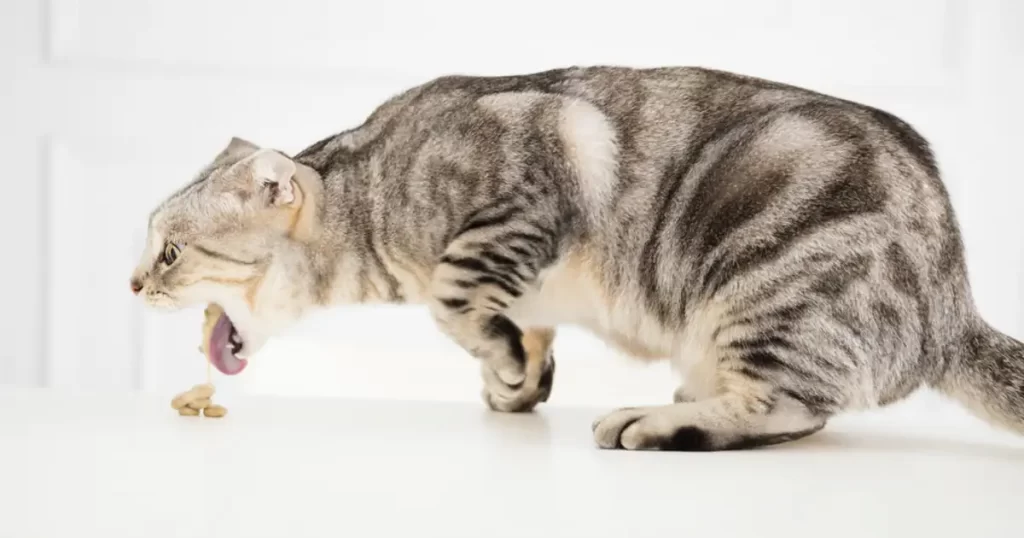
If you notice any of these symptoms, call your local veterinarian as soon as possible and seek immediate treatment for your cat.
Depending on the severity of the case, your vet might suggest a range of remedies including an intravenous drip, administering activated charcoal to absorb any toxins, and inducing vomiting.
Is There a Danger of My Cat Becoming Addicted to Tea?
No, there is no danger of cats becoming addicted to tea. Caffeine is toxic to cats in larger quantities, and cats lack the enzymes and pathways needed to break down and eliminate caffeine. Instead of becoming addicted, the cat will just pass away.
Additionally, cats will usually avoid tea due to its bitter taste, making it highly unlikely that they would become addicted.
If a cat drinks more than a few drops of tea, it is important to contact a vet right away.
How Much Tea Can a Cat Safely Drink?
The answer is none. Cats should not consume caffeine in any of its forms, including tea, as it can cause many health problems such as poisoning, vomiting, diarrhea, and tachycardia. Even a small amount of caffeine can be toxic to cats, with the toxic threshold being estimated to be 80 milligrams per 3.6 pounds of body weight.
A cup of black tea contains 50 milligrams of caffeine, so it is better to offer water instead of tea.
What Are the Long-term Effects of Cats Drinking Tea?
The long-term effects of cats drinking tea can be severe and even fatal. Over time, the accumulation of substances in the cat’s body that it cannot digest will become toxic and could lead to organ failure.
Prolonged exposure to caffeine can cause dehydration, unconsciousness, and death.
